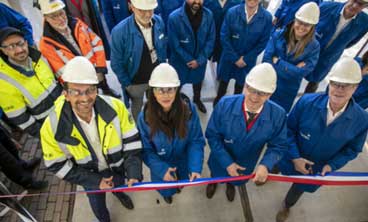Green news: Trinseo starts up PC recycling pilot facility in Netherlands; Idemitsu Kosan, Kumho Petrochemical and Sumitomo tie up for biobased styrene

Speciality materials firm Trinseo has inaugurated its polycarbonate (PC) dissolution pilot facility in Terneuzen, the Netherlands. The new pilot facility is a major step in Trinseo’s commitment to sustainability, part of the journey in realizing the company’s sustainability goals.
“Dissolution recycling” is a type of physical recycling process where the needed polymer is extracted by the use of solvents. The extracted polymers will then be used to make new recycled polymers. Trinseo’s PC dissolution technology is an advanced technology by which post- or pre-consumer materials containing PC, be it an automotive or consumer electronics part that is mixed with other plastics, metal or even glass, can be put directly into the solvent without any pre-treatment. The solvent will dissolve PC contained in those end-of-life parts while all other non-PC materials will remain, and can then be used for other recycling purposes. The dissolved PC extracted is 100% recycled PC that could be used for compounding into new materials for an array of applications, such as mobile phone casing, printer enclosure or automotive parts.
“We are very excited to have started up the pilot facility for PC dissolution,” said Francesca Reverberi, Senior Vice President & Chief Sustainability Officer at Trinseo, “This technology deepens the potential in circularity.”
The pilot plant will play a significant role in helping Trinseo achieve its 2030 Sustainability Goals, while accelerating recycling and increasing the supply of sustainable feedstock.
In other news, chemical firms Idemitsu Kosan Co., Kumho Petrochemical Co. and Sumitomo Corporation have signed Memorandum of Understanding (MOU) to establish a long-term collaboration for the development and further growth of the sustainable polymers and chemicals market in Asia.

In this project, Japan’s Idemitsu, the largest styrene monomer manufacturer in Japan, will produce bio-styrene in the mass balance method. Kumho, the largest synthetic rubber manufacturer in South Korea, will produce bio-SSBR (Solution Styrene Butadiene Rubber), one of main products for high-functional tyres by using bio-SM.
Sumitomo Corporation will be coordinating the collaboration and develop bio material market. The companies plan to commence production of biopolymer in 2024.
Bio-SM is from bio-naphtha that is bio-based raw material such as waste and residues. Conventionally, naphtha is extracted from crude oil and has been widely used to produce basic chemical elements such as ethylene and butadiene. By increasing the use of bio-SM from bio-naphtha, the companies expect to reduce carbon and greenhouse gas (GHG) generation, or carbon footprint, as well as strengthen ESG management cooperation network.
Meanwhile, Kumho Petrochemical has previously carried out various ESG management activities such as the Recycled Styrene (RSM) project that recycles waste PS (polystyrene) and applies it to SSBR, and the post consumer recycled project that reprocesses used and discarded plastic containers and transforms them into high-quality refrigerator parts.
(PRA)
Subscribe to Get the Latest Updates from PRA Please click here
©2023 Plastics and Rubber Asia. All rights reserved.

©2023 Plastics and Rubber Asia. All rights reserved.
Home Terms & Conditions Privacy Policy Webmail Site Map About Us















